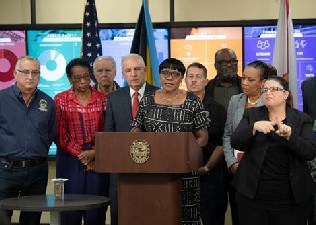Give us the tools, say Caribbean Scribes
ST. JOHN’S, Antigua and Barbuda – Journalists in the Caribbean say they can’t find adequate training and mentorship in the region. Can editors and senior personnel at media houses develop this burgeoning talent? What tools does this new generation of media workers need to advance themselves?
Journalists from the Caribbean and the Diaspora will look at how the media leaders can write a positive end to this old story. These and other questions will be put at the upcoming 8th Caribbean Media Exchange on Sustainable Tourism (CMEx) in Puerto Rico, from February 9-13th, 2006.
Its theme is “Sustainable Development: A Balancing Act,” and delegates will take a serious look at the quality of journalism in the Caribbean as well as at how to encourage tourism developments which create wealth while cultivating local culture and conserving the fragile environment.
Anika Kentish, a news producer at Antigua’s Observer Radio, says a lack of qualified supervisors and quality interaction with senior media personnel presents an obstacle for young reporters. “It is easy to say young reporters are poorly supervised and are not being offered attractive salaries, but the bottom line is that there are many senior media personnel who appear ill-equipped to handle management positions.”
Due to inattention and mismanagement, young media professionals are more likely to be turned off from the field, Kentish says and “as a result, talented journalists are either misguided or get frustrated and move on to other fields (usually public relations).”
Yahneake Sterling, staff reporter for the Jamaica Gleaner, agrees that senior editors can do more to nurture young reporters, particularly by creating an atmosphere of actively learning the “tricks of the trade.” “[Editors] can discuss in detail the stories the reporter has written; [they can] point out the mistakes and give pointers on how to improve on these mistakes, instead of just editing the mistakes made.”
How can Caribbean media houses improve reporting quality and prevent the hemorrhaging of young reporters from the field? Both Kentish and Sterling see practical training and professional development as essential to seasoning unseasoned journalists. “The solution lies in training that must include every position from entry level to management,” Kentish asserts.
But, Kentish warns that training must also be matched with willingness of senior personnel to hone their own skills – frustration builds when young professionals clash with outdated models, she argues. “It is also unfortunate that a number of senior media personnel are not interested in training programs, choosing to remain settled in their old routine. This often results in substandard news and programming, which could substantially hurt a media house’s bottom line.”
According to Sterling, training and hands-on mentorship for young reporters can make a real difference and is needed. “Training in the class room is not enough for reporters and as such, editors must school young reporters, so that they can adapt to the real world of journalism and also adapt to the style of writing used by that particular media house.”
Media associations, such as the Association of Caribbean Media Workers (ACM), are seen as another valuable resource for journalists to develop skills, though these groups need the support of the regional media and funding resources for longevity.
CMEx is an interactive workshop that allows journalists from the Caribbean, North America and Europe to interact with representatives of the hospitality sector and government and discuss tourism policies aimed at improving the lives of Caribbean people.


